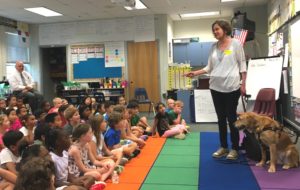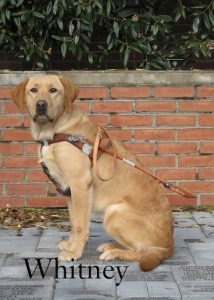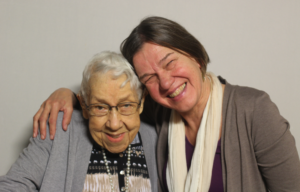I dig this Marcus Roberts cat
December 15, 2019 • Comments • Posted in blindness, careers/jobs for people who are blind, Mike Knezovich I spent last Sunday afternoon with my husband Mike and friends Jim Loellbach and Dr. Janet Smith enveloped in holiday music. Not your everyday stuff – this was the Marcus Roberts Trio with the Chicago Philharmonic, playing holiday classics arranged by Duke Ellington. A Concerto written by George Gershwin. Holiday jazz.
I spent last Sunday afternoon with my husband Mike and friends Jim Loellbach and Dr. Janet Smith enveloped in holiday music. Not your everyday stuff – this was the Marcus Roberts Trio with the Chicago Philharmonic, playing holiday classics arranged by Duke Ellington. A Concerto written by George Gershwin. Holiday jazz.
I love jazz and am especially fond of jazz piano. The first time I recall hearing Marcus Roberts was back in the 20th century. (Yikes.) Mike and I were lucky enough to walk into a record store in Champaign called Record Service when they happened to be playing one of his albums. We’ve been fans ever since, listening to Marcus Roberts recordings and hearing him perform live with Wynton Marsalis Jazz at Lincoln Center bands and later, with his own trio. At one of those trio concerts, Mike kindly nudged me and whispered, “You know he’s blind, right?”
He’s blind?! I didn’t know. Quirky fact: Without having sight, it’s hard to know if someone else can’t see, either.
My fondness for Marcus grew after that. We bought more of his CDs, and I finally got to meet him in person: Mike and I were still living in Urbana 20 years ago when Marcus Roberts did a weeklong artist-in-residence gig at the University of Illinois. The public was invited to come and listen. I stalked him at every workshop and performance he gave. Not an easy feat for a blind woman, but well worth the trouble.
Between tunes at the first workshop, Marcus told us what it was like to grow up blind, how he first learned to read Braille music, and the frustrations he faces when traveling to and from gigs.
“When our plane landed this morning, I stood up. The flight attendant brought in a wheelchair.” He paused for a moment. He was looking at us, I could tell. “I was STANDING. You with me?!” he finally continued. “I wonder, do they give white canes to dudes who need wheelchairs?”
I was spellbound. So, it seemed, was the rest of the audience. We all broke out in laughter.
Marcus went on to explain how he communicates to his trio during a performance without being able to see them. Drummer Jason Marsalis demonstrated the cadence he uses to cue a key change. Marcus showed us a pattern he plays on the upper register to cue bass player Roland Garrons for a solo. Afterward, we were encouraged to ask questions. I directed mine to Jason and Roland. “When Marcus approached you to play in his trio, did you hesitate at all?”
No answer.
“I mean, knowing there might be extra work involved, him being blind and all.”
They both stayed quiet for a while. Finally, Jason piped up. “In jazz, when you’re offered a gig, you take it.”
Roland asked to add something to that. He’d played with a lot of musicians over the years, he said, and a lot of them get lazy. “But with Marcus, he’s always coming up with something new. And when you play with Marcus, you really have to listen. I think we’re better for that.”
Amen.
Marcus and I had a chance to talk after a performance later that week. “Have you always talked about your blindness like that?” I asked him.
“Oh, man, no!” he answered. What a voice! “I used to do what so many other blind people do — pretend it doesn’t exist, it’s no bother.”
I nodded my head in agreement. You might think you have to be able to see to know if someone is nodding, but we know. “What made you decide to start talking about it, then?”
“About five or six years ago, I just thought, man, I deal with this every day. I might as well talk about it.”
What a relief it was to hear him talking so candidly about blindness.
At that time I’d been writing a book about losing my sight as an adult. Long Time, No See was in the midst of reviews and editing just then, due out in a couple months. “I’d like to read it,” Marcus said.
I got his address, contacted rehab services at the University of Illinois in Urbana-Champaign, and they agreed to print a Braille version of the advanced copy. Marcus liked the book so much, he agreed to do a blurb for the cover.
So there you have it. My brush with fame. I haven’t spoken one-on-one with Marcus since then, but his performance from that Chicago concert stage of Gershwin’s Concerto in F last Sunday? It spoke to me. What a sensational way to start celebrating the holidays this year.
A different version of this post originally appeared last week on the Easterseals National blog.


